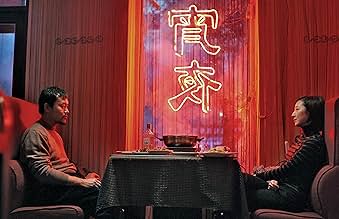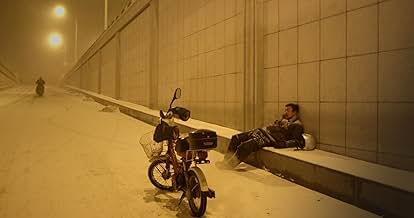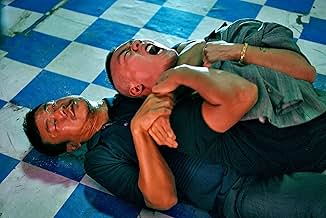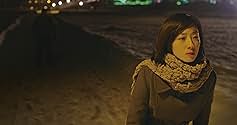IMDb-BEWERTUNG
6,7/10
10.008
IHRE BEWERTUNG
Ein Ex-Cop und sein Ex-Partner haben sich gerade entschieden, nochmals einer Reihe von Morden nachzugehen, die ihre Karriere beendet hatten und die sie immer noch mit tiefen Schuldgefühlen b... Alles lesenEin Ex-Cop und sein Ex-Partner haben sich gerade entschieden, nochmals einer Reihe von Morden nachzugehen, die ihre Karriere beendet hatten und die sie immer noch mit tiefen Schuldgefühlen belasten, als erneut identische Morde begangen werden.Ein Ex-Cop und sein Ex-Partner haben sich gerade entschieden, nochmals einer Reihe von Morden nachzugehen, die ihre Karriere beendet hatten und die sie immer noch mit tiefen Schuldgefühlen belasten, als erneut identische Morde begangen werden.
- Auszeichnungen
- 28 Gewinne & 46 Nominierungen insgesamt
Empfohlene Bewertungen
This 2014 Golden Berlin Bear winner (with a rare second Silver Berlin Bear award of BEST ACTOR for Fan Liao) is Chinese director Yi'nan Diao's third feature, and his first to be shown in cinemas and harvested over one hundred million RMB, roughly equivalent to 16 million dollars, thanks to the international accolades it received. Its original title can be translated verbatim as "White Day Fireworks", it is the name of a nightclub which would be revealed as a crucial thread to a murder case, furthermore Diao arranges a literal daytime firework show to climax the film in the coda, meanwhile, its official English title: Black Coal, Thin Ice, betrays the locations which relation all the murder cases during a five-year span.
The film starts in 1999, in an unspecified city in China's North-east province Heilongjiang, Zhang (Liao) is a recently-divorced policeman, during a fresh case of a dismembered body scattered in sundry collieries where an I.D. card indicates the dead is Liang (Xuebing Wang), but due to his negligence, two fellow policemen are killed in operation while Zhang is also wounded. After that, the time jumps to 2004, now Zhang is a life-beaten drunkard and works as a security guard, two new dismembered bodies have been found, all link back to Liang's wife Wu (Gwei), whose mysterious mien attracts Zhang, he embarks on a personal investigation to follow her, strike up a conversation with her in the dry-cleaner where she works, and eventually ask her out for an ice-skating date. But at the same time, danger is lurking around him too, is Liang really dead? Or is Wu as innocent as she looks? Can all the mysteries be brought into daylight in the end or is there another lie involved? Diao smugly leaves an semi-opening end with many spurious clues (e.g. the cremains Wu buried under the tree Vs. her apparent lie of discarding it over the sea during the inquiry), to prompt viewers for disparate interpretations.
This film is to a great extent inscribed as an art-house fare with its lurid background or foreground colour embedding in almost every scene, the visual palette is meticulously chosen and also overtly, Diao is a faithful apprentice of symbolism, from a battered ladybug on the bedsheets in the opening sequence, to an abrupt introduction of a deserted horse left by junkmen, until the firework finale reaches the hallmarks of its veiled fatalism pretentiousness buried in his not-so-justifiable script, there must be a more plausible reason behind a redemption by right of admitting a murder one might not execute, it unfortunately gives an impression of a desperate trick to glaze over the banality of the story, to romanticize the damsel-in-distress reverie.
The whole story is a dancing-on-the-edge between a sex-driven anti-hero and a irresolute femme fatale, with a jarring red herring which leads to nowhere. But the two leads are giving fantastic performances, Fan Liao breathes out the irascible mentality stinkingly inflicted on a non-starter who clings to the last straw and strives to feel the ardor of living again. While Lun Mei Gwei from Taiwan, may seem to be an odd choice for a North-east girl, heedfully, she doesn't have many lines to give away her southern accent, instead, relies on her body language and facial expressions, her air of mystique is the most enticing feature entraps audience even in the film's banalest moment.
Winning over the likes of BOYHOOD (2014, 8/10) and THE GRAND BUDAPEST HOTEL (2014, 8/10) in Berlin inevitably becomes an over-achievement for this intense crime-thriller, but put it among its Chinese peers of the same year, the film can excel most of them hands down, as one of the must-see from the over-ballooning market where ingrainedly burdened with shoddy soil damages its own commodities.
The film starts in 1999, in an unspecified city in China's North-east province Heilongjiang, Zhang (Liao) is a recently-divorced policeman, during a fresh case of a dismembered body scattered in sundry collieries where an I.D. card indicates the dead is Liang (Xuebing Wang), but due to his negligence, two fellow policemen are killed in operation while Zhang is also wounded. After that, the time jumps to 2004, now Zhang is a life-beaten drunkard and works as a security guard, two new dismembered bodies have been found, all link back to Liang's wife Wu (Gwei), whose mysterious mien attracts Zhang, he embarks on a personal investigation to follow her, strike up a conversation with her in the dry-cleaner where she works, and eventually ask her out for an ice-skating date. But at the same time, danger is lurking around him too, is Liang really dead? Or is Wu as innocent as she looks? Can all the mysteries be brought into daylight in the end or is there another lie involved? Diao smugly leaves an semi-opening end with many spurious clues (e.g. the cremains Wu buried under the tree Vs. her apparent lie of discarding it over the sea during the inquiry), to prompt viewers for disparate interpretations.
This film is to a great extent inscribed as an art-house fare with its lurid background or foreground colour embedding in almost every scene, the visual palette is meticulously chosen and also overtly, Diao is a faithful apprentice of symbolism, from a battered ladybug on the bedsheets in the opening sequence, to an abrupt introduction of a deserted horse left by junkmen, until the firework finale reaches the hallmarks of its veiled fatalism pretentiousness buried in his not-so-justifiable script, there must be a more plausible reason behind a redemption by right of admitting a murder one might not execute, it unfortunately gives an impression of a desperate trick to glaze over the banality of the story, to romanticize the damsel-in-distress reverie.
The whole story is a dancing-on-the-edge between a sex-driven anti-hero and a irresolute femme fatale, with a jarring red herring which leads to nowhere. But the two leads are giving fantastic performances, Fan Liao breathes out the irascible mentality stinkingly inflicted on a non-starter who clings to the last straw and strives to feel the ardor of living again. While Lun Mei Gwei from Taiwan, may seem to be an odd choice for a North-east girl, heedfully, she doesn't have many lines to give away her southern accent, instead, relies on her body language and facial expressions, her air of mystique is the most enticing feature entraps audience even in the film's banalest moment.
Winning over the likes of BOYHOOD (2014, 8/10) and THE GRAND BUDAPEST HOTEL (2014, 8/10) in Berlin inevitably becomes an over-achievement for this intense crime-thriller, but put it among its Chinese peers of the same year, the film can excel most of them hands down, as one of the must-see from the over-ballooning market where ingrainedly burdened with shoddy soil damages its own commodities.
It seems that, every few years, there are one or two Chinese films that, despite being slow-paced, dark, and lacking A-list stars, somehow manage to attract a large domestic audience without being controversial enough to risk complete censorship. In 2014, the only example I have seen so far is this, Black Coal, Thin Ice. The reason for its domestic success is presumably because of its awards at the Berlin Film Festival.
As the story unfolds, despite being based around a series of murders, the film has a pace more similar to an art-house film than a crime- thriller. A couple of scenes were impressively disturbing, made even more so by the slow paced, subtle atmosphere surrounding them.
The setting of a polluted, dark, seedy city in a long Heilongjiang winter seems perfect for the noir tone of the film. A subtle musical score, with some dissonant strings combined with (terrible) Chinese pop songs (intra-diegetic) creates a fantastic atmosphere. The closest thing to it I have seen is Suzhou River, which, now I come to think of it, has a lot of similar motifs (I haven't seen Diao Yinan's previous films).
The acting performances were all impressive, the female lead (played by Taiwanese Gwei/Gui Lun-Mei) seemed suitably out of place in the Far Northeast of Mainland China. Liao Fan's male lead, and Wang Xuebing's character, were both impressive.
Despite a bit of dark humour that made me giggle, Black Coal, Thin Ice is a relentlessly grim and slightly disturbing film. I was impressed that it wasn't (more) censored in China, as it paints a pretty depressing picture. Despite being enthralled by the film, I won't be booking a flight to Heilongjiang any time soon.
As the story unfolds, despite being based around a series of murders, the film has a pace more similar to an art-house film than a crime- thriller. A couple of scenes were impressively disturbing, made even more so by the slow paced, subtle atmosphere surrounding them.
The setting of a polluted, dark, seedy city in a long Heilongjiang winter seems perfect for the noir tone of the film. A subtle musical score, with some dissonant strings combined with (terrible) Chinese pop songs (intra-diegetic) creates a fantastic atmosphere. The closest thing to it I have seen is Suzhou River, which, now I come to think of it, has a lot of similar motifs (I haven't seen Diao Yinan's previous films).
The acting performances were all impressive, the female lead (played by Taiwanese Gwei/Gui Lun-Mei) seemed suitably out of place in the Far Northeast of Mainland China. Liao Fan's male lead, and Wang Xuebing's character, were both impressive.
Despite a bit of dark humour that made me giggle, Black Coal, Thin Ice is a relentlessly grim and slightly disturbing film. I was impressed that it wasn't (more) censored in China, as it paints a pretty depressing picture. Despite being enthralled by the film, I won't be booking a flight to Heilongjiang any time soon.
In snow covered streets surrounded by perpetual darkness detectives and suspects are made distinguishable only by the soft glow of neon signs. Faces are shrouded by shadow, characters motives are unclear. We are in very classic noir territory in Black Coal, Thin Ice.
A brutal murder occurs in Northern China. Severed limbs appear simultaneously across the country in coal plants. The investigation into the murder is botched, leaving detective Zhang Zili injured, ashamed and without a job. Five years later, body parts are found in coal plants. Now an alcoholic and working as a security guard, Zhang once again finds himself in the pursuit of the mysterious mass murderer. The only connection between the two cases is a beautiful dry cleaning assistant Wu Zhizhen, who soon becomes the object of Zhang's obsession.
An intriguing combination of neo-noir and Chinese realism, Black Coal, Thin Ice demonstrates director Yi'nan Diao's genre literacy. From the lighting, to the troubled anti-hero, to the femme-fatale, the film is full of noir tropes. What makes the film unique is the camera's continual shift to the mundane. Unlike the modern Tarantino-inspired trend, the revelations and acts of violence are down-played. Plot takes a back seat to atmosphere as the audience is immersed in a bleak, nihilistic vision of modern China.
Winner of the Golden Bear at the Berlin film festival, Black Coal, Thin Ice has been a hit with critics but it's hard to see it winning any audience awards. The slow pace and dark, defeatist world view will be a turn off for most audience but if you don't view those as detractors, and if you are a fan of noir then this is a film to see.
A brutal murder occurs in Northern China. Severed limbs appear simultaneously across the country in coal plants. The investigation into the murder is botched, leaving detective Zhang Zili injured, ashamed and without a job. Five years later, body parts are found in coal plants. Now an alcoholic and working as a security guard, Zhang once again finds himself in the pursuit of the mysterious mass murderer. The only connection between the two cases is a beautiful dry cleaning assistant Wu Zhizhen, who soon becomes the object of Zhang's obsession.
An intriguing combination of neo-noir and Chinese realism, Black Coal, Thin Ice demonstrates director Yi'nan Diao's genre literacy. From the lighting, to the troubled anti-hero, to the femme-fatale, the film is full of noir tropes. What makes the film unique is the camera's continual shift to the mundane. Unlike the modern Tarantino-inspired trend, the revelations and acts of violence are down-played. Plot takes a back seat to atmosphere as the audience is immersed in a bleak, nihilistic vision of modern China.
Winner of the Golden Bear at the Berlin film festival, Black Coal, Thin Ice has been a hit with critics but it's hard to see it winning any audience awards. The slow pace and dark, defeatist world view will be a turn off for most audience but if you don't view those as detractors, and if you are a fan of noir then this is a film to see.
How does a Chinese director empty the noir sensibility of any and all of the glamour associated with its Hollywood counterpart? How does it become a study in pure dourness and grimness? If you're Yi'nan Diao, the first thing you do is set it in a place as grim and dour as a northern Chinese factory town circa 1999. In this frozen wasteland that may or may not be Harbin – it doesn't matter, it could be Siberia – the ball gets rolling when dead body parts start showing up on the conveyor belt of a coal processing plant: after all, in this time and space in China, the human body is just another physical commodity
Following a bloody shootout that leaves the two main suspects and two of his partners dead, we jump forward five years to find the surviving detective, Zhang Zili, paralyzed by the trauma, retired from the police force and passed out in the snow in an alcoholic stupor. But things are never what they seem in noir, right? So he's dragged back into the case when a former partner of his suspects the involvement of a black widow- like female at the heart of the matter. An exotic call girl? A mysterious nightclub singer? No – just some depressed woman who works at a dry cleaner's where she's regularly mauled by her piggish oaf of a boss.
The plot is unimportant, really, because the film is one big painting, a night-time world where the neon signs of the internet gambling dens and bleak taxi-dancing joints are beaten into submission by the cold dark chill of northern China, where all color and light are sucked into the film's essence, which is nothing but a black hole, a gravitational death machine that swallows up every photon in sight. At one point, while spinning around the world's most depressing ice skating rink, Zili asks his former partner, "Does anybody ever really win at life?" Of course not. Like all the other catatonic ice skaters, he's just going round and round, sometimes ahead, sometimes behind (depending on one's point of view ) getting nowhere while people continue to copulate and kill and die. The key to the film is the direct translation of the Chinese title, which means "daytime fireworks." I'll let you figure that out for yourself, but if you like your noir pitch-black, this one's for you.
Following a bloody shootout that leaves the two main suspects and two of his partners dead, we jump forward five years to find the surviving detective, Zhang Zili, paralyzed by the trauma, retired from the police force and passed out in the snow in an alcoholic stupor. But things are never what they seem in noir, right? So he's dragged back into the case when a former partner of his suspects the involvement of a black widow- like female at the heart of the matter. An exotic call girl? A mysterious nightclub singer? No – just some depressed woman who works at a dry cleaner's where she's regularly mauled by her piggish oaf of a boss.
The plot is unimportant, really, because the film is one big painting, a night-time world where the neon signs of the internet gambling dens and bleak taxi-dancing joints are beaten into submission by the cold dark chill of northern China, where all color and light are sucked into the film's essence, which is nothing but a black hole, a gravitational death machine that swallows up every photon in sight. At one point, while spinning around the world's most depressing ice skating rink, Zili asks his former partner, "Does anybody ever really win at life?" Of course not. Like all the other catatonic ice skaters, he's just going round and round, sometimes ahead, sometimes behind (depending on one's point of view ) getting nowhere while people continue to copulate and kill and die. The key to the film is the direct translation of the Chinese title, which means "daytime fireworks." I'll let you figure that out for yourself, but if you like your noir pitch-black, this one's for you.
A Chinese crime drama with a good storyline and convincing acting. Low key style with a mix of random everyday events and a police investigation. Filmed in a realist style with some surreal moments.
A series of murders, whose hallmarks are numerous body parts being found around the Province, perplex detectives and leave them with a failed investigation. A former member of the force, sacked for incompetence, takes the initiative and follows a lead.
Slow paced but gripping. We are given insights into the characters' lives, motivations and idiosyncrasies alongside their roles in the unfolding world of the murder investigation. What it lacks in action is made up for in a range of intriguing characters and quirky events.
A series of murders, whose hallmarks are numerous body parts being found around the Province, perplex detectives and leave them with a failed investigation. A former member of the force, sacked for incompetence, takes the initiative and follows a lead.
Slow paced but gripping. We are given insights into the characters' lives, motivations and idiosyncrasies alongside their roles in the unfolding world of the murder investigation. What it lacks in action is made up for in a range of intriguing characters and quirky events.
Wusstest du schon
- WissenswertesThe literal translation of the Chinese title is 'Daylight Fireworks'. This is the name of the nightclub where Zhang learns a major lead, and is also echoed in the last scene.
- VerbindungenReferences Xia nu Shisan Mei (1986)
Top-Auswahl
Melde dich zum Bewerten an und greife auf die Watchlist für personalisierte Empfehlungen zu.
- How long is Black Coal, Thin Ice?Powered by Alexa
Details
- Erscheinungsdatum
- Herkunftsländer
- Offizieller Standort
- Sprache
- Auch bekannt als
- Black Coal, Thin Ice
- Drehorte
- Produktionsfirmen
- Weitere beteiligte Unternehmen bei IMDbPro anzeigen
Box Office
- Weltweiter Bruttoertrag
- 16.830.885 $
- Laufzeit1 Stunde 50 Minuten
- Farbe
- Seitenverhältnis
- 1.85 : 1
Zu dieser Seite beitragen
Bearbeitung vorschlagen oder fehlenden Inhalt hinzufügen

Oberste Lücke
By what name was Feuerwerk am helllichten Tage (2014) officially released in Canada in French?
Antwort






















